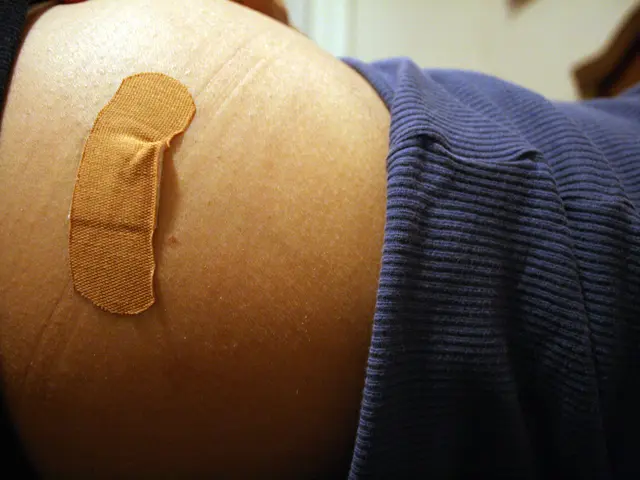A Game-Changer for Migraine Sufferers: Ubrogepant Eases Pre-Attack Symptoms
Drug therapy revolutionizes migraine treatment landscape
Migraines aren't just a simple headache—they cause misery for millions worldwide, with some patients experiencing debilitating symptoms for days or even hours before an attack. But there's some good news on the horizon, with a US-approved drug showing promise in easing those pre-attack symptoms. A leading German expert even hints at a "paradigm shift" in migraine treatment.
Ubrogepant, already a staple in the US for acute migraine treatment, has been found to improve symptoms during the pre-attack phase known as the prodromal phase. This phase—which affects around 30-50% of migraine patients—can bring symptoms like fatigue, cognitive issues, neck pain, increased light sensitivity, and noise sensitivity.
With its approval in the US, Ubrogepant has been around for a few years, but it hasn't made it to Europe yet. It belongs to the innovative class of gepants or CGRP receptor antagonists (calcitonin gene-related peptide), which work by blocking a vital messenger substance involved in migraines.
Currently, two preparations from this class are approved in Europe, with Atogepant being widely used for migraine prevention in Germany.
Significant Improvements in Pre-Attack Symptoms
Despite the primary focus of the initial approved study on preventing migraine headaches, a research team delved into whether Ubrogepant could also alleviate prodromal symptoms when taken in the early hours of a potential attack. The study showed clear benefits in this area. After two hours, light sensitivity improved or vanished in 19.5% of participants who took the medication, compared to only 12.5% in the placebo group. Nearly 27% reported no more unusual fatigue three hours after taking Ubrogepant, compared to about 17% with a placebo.
Nearly 29% reported significant neck pain relief three hours after taking Ubrogepant, compared to about 19% in the control group. And after four hours, about 51% reported reduced sensitivity to noise, compared to about 36% with a placebo.
"This is clinically worthwhile," Christian Maihöfner, head physician of the Neurological Clinic at the Klinikum Fürth, stated, emphasizing that the medication offers significant benefits for some patients.
A New Era in Migraine Treatment?
The study, while an extension of the initial study that primarily focused on the prevention of headaches, offers a glimmer of hope for future migraine treatment. Side effects like nausea, fatigue, and dizziness are rare, and severe side effects haven't been reported. Further studies are needed to specifically focus on preventing prodromal symptoms, according to the study authors.
Hartmut Göbel, chief physician of the Pain Clinic Kiel, also noted the potential for a "paradigm shift" in migraine treatment, moving away from acute pain treatment and toward targeted intervention in the early stages of migraines. The success of this approach will ultimately depend on more robust future studies.
So, buckle up migraine sufferers—a new era in treatment may be upon us!
- Migraine
- Pain
- Health
- Disease
Enrichment Data:
Current Research and Development Status of Ubrogepant:
Ubrogepant showcases significant potential as a migraine treatment by addressing not only headache symptoms but also pre-attack symptoms such as photophobia, phonophobia, fatigue, neck pain, and cognitive dysfunction. In studies, Ubrogepant has been found to reduce these symptoms more effectively than a placebo. Improvements in symptoms like concentration have been observed within an hour of taking the medication. Potentially, ubrogepant may even prevent a full migraine attack when taken during the prodromal phase.
Key Findings:
- Symptom Reduction: Ubrogepant has demonstrated reductions in various prodromal symptoms, showing more effectiveness than a placebo.
- Timeframe for Improvement: Significant improvements in symptoms like concentration have been observed within an hour of taking the medication. Reductions in sensitivity to noise were seen four hours post-administration.
- Potential for Preventing Attacks: Ubrogepant may potentially prevent the onset of a full migraine attack when taken during the prodromal phase.
Future Directions:
- Need for Further Research: To fully understand ubrogepant’s impact on premonitory symptoms, further studies are necessary, with a focus on objective measurements of neurological changes during the prodromal phase.
- Clinical Implications: By addressing prodromal symptoms, ubrogepant offers an advantage over traditional migraine treatments like triptans, which are usually used only after the headache begins.
- The new US-approved drug, Ubrogepant, is showing promising results in alleviating pre-attack symptoms of migraines, such as light sensitivity, unusual fatigue, neck pain, increased light sensitivity, and noise sensitivity, during the prodromal phase.
- Ubrogepant, a member of the innovative class of gepants or CGRP receptor antagonists, has been observed to reduce various prodromal symptoms, including photophobia, phonophobia, fatigue, neck pain, and cognitive dysfunction, more effectively than a placebo.
- The success of Ubrogepant in addressing pre-attack symptoms could potentially signal a shift in the approach to migraine treatment, moving towards targeted intervention in the early stages of migraines, thereby improving the overall health and wellness of migraine sufferers.








